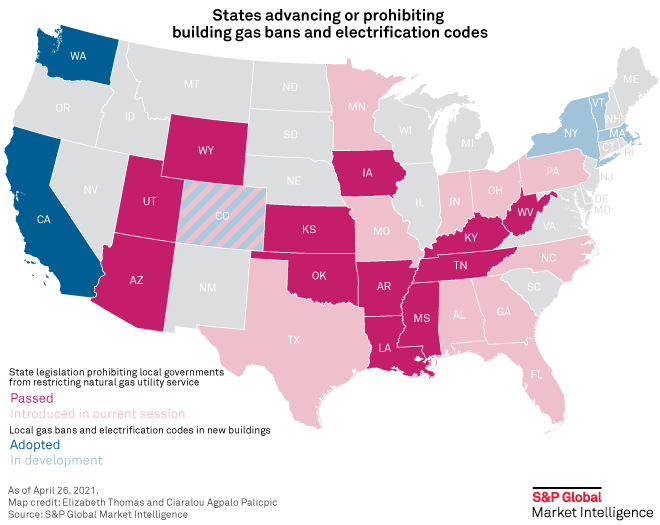S&P Global Offerings
Featured Topics
Featured Products
Events
S&P Global Offerings
Featured Topics
Featured Products
Events
S&P Global Offerings
Featured Topics
Featured Products
Events
Banking & Capital Markets
Economy & Finance
Energy Transition & Sustainability
Technology & Innovation
Podcasts & Newsletters
Banking & Capital Markets
Economy & Finance
Energy Transition & Sustainability
Technology & Innovation
Podcasts & Newsletters
S&P Global Offerings
Featured Topics
Featured Products
Events
27 May, 2021
Lawmakers in New York City introduced legislation that would essentially prohibit natural gas use in new buildings and major renovations, marking a new step in the most populous U.S. city's effort to decarbonize its building stock.
The bill, Intro 2317 introduced May 27, would update the city's building code to prohibit new and renovated buildings from combusting fossil fuels, including natural gas, propane and heating oil. It would accelerate New York City's bid to join the ranks of dozens of California towns and cities and Seattle in requiring new construction to be all-electric or heated through renewable energy.

Mayor Bill de Blasio first announced his intention to work with City Council to develop a new building gas ban in February 2020. At the time, his administration aimed to stop the use of fossil fuels in large building systems by 2040. In January, de Blasio said the city should ban fossil fuel hookups by 2030.
However, de Blasio lacked a partner in City Council to bring forward legislation when he made the 2020 pronouncement. In an interview with S&P Global Market Intelligence, the former director of the mayor's Office of Sustainability, Mark Chambers, explained that the city could build on existing mechanisms and legislation to achieve the goal, rather than explicitly banning gas hookups.
The introduction of a City Council bill creates a more direct, explicit path to restricting gas use in new and renovated buildings. It leverages the city's authority to update the building code and over air pollution control, according to Amy Turner, a senior fellow for the Cities Climate Law Initiative at Columbia Law School's Sabin Center for Climate Change Law.
"Focusing on air emissions is a new approach to driving electric appliances," Turner told Market Intelligence. "So far, we have seen local governments amend their local building codes to require or incentivize electric appliances, but they've done so just by saying so, by invoking electric appliances expressly. What we haven't seen yet is this focus on air pollution control authority."
Under the ordinance, the building code would prohibit any person from combusting "any substance that emits 50 kilograms or more of carbon dioxide per million British thermal units of energy within a building within the city," based on emissions profiles provided by the U.S. Energy Information Administration.
According to the EIA, natural gas emits 117 pounds, or roughly 53 kg, of CO2 per million Btus of energy used. Propane, gasoline, diesel fuel and heating oil all have higher emissions profiles.
That approach also aligns with how the city regulated carbon emissions from existing buildings under the 2019 legislation known as Local Law 97, Turner added. "It's very consistent with the type of authority that New York City has asserted in the past with respect to buildings."
The bill comes as New York state utility regulators are seeking to align long-term gas-planning with the state's legally mandated climate goals. The proceeding aims to reduce investment in fossil fuel infrastructure by utilities like National Grid USA and Consolidated Edison Co. of New York Inc., which distribute gas in New York City and Long Island. That proceeding stems from a dispute with National Grid over the state's refusal to permit new gas pipeline capacity into the city, and the company's subsequent moratorium on new gas hookups.
City Council Member Alicka Ampry-Samuel sponsored the legislation along with Council Member Carlina Rivera, Deputy Leader of the City Council Jimmy Van Bramer and New York City Public Advocate Jumaane Williams, a high-ranking official who serves as the city's ombudsman.
Ampry-Samuel represents several neighborhoods in eastern Brooklyn that have historically been home to communities of color, including Bedford-Stuyvesant, Crown Heights and Brownsville. "We're talking about cost savings. We're talking about health. We're talking about making sure that we are protecting the everyday New Yorker and focusing on our future," the council member said during a May 18 online rally. "We have been systematically left out of conversations about climate change in communities that I represent."
The legislation also has the backing of Council Member Brad Lander, a long-time progressive leader who is currently running for New York City comptroller. "We MUST stop building fossil fuel infrastructure in 2021 — not 2030, 2040, or another far-off date. Our future depends on it," Lander tweeted during the rally.
Nonprofit organizations the New York Public Interest Research Group, New York Communities for Change and WE ACT for Environmental Justice supported the development and publicity of the legislation.
As introduced, the bill would go into effect two years after it becomes law. It includes exemptions where fossil fuel combustion is required for standby power, manufacturing or operation of a laboratory, laundromat, hospital or commercial kitchen. It also gives building owners an opportunity to demonstrate to the commissioner of buildings that compliance would create undue hardship.
